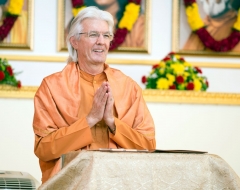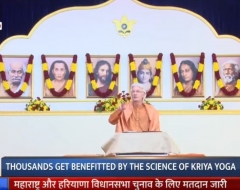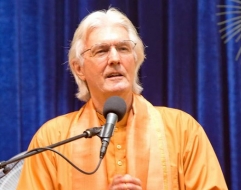On May 12, 2017, Swami Lalitanandaji's editorial on 'The Wisdom Way of Overcoming Karma' appeared in the Speaking Tree section of India's leading English-language national daily, the Times of India.
Here is the text of the editorial, which you may also read on the website of the Speaking Tree:
 Why is a person born with everything in life, while another struggles to fulfill even his basic needs? A silver spoon for some, and not even a small piece of bread for another? This is hard to digest and understand. Who decides it anyway? Do we just follow a course as per algorithms set by a fate-maker?
Why is a person born with everything in life, while another struggles to fulfill even his basic needs? A silver spoon for some, and not even a small piece of bread for another? This is hard to digest and understand. Who decides it anyway? Do we just follow a course as per algorithms set by a fate-maker?
Adi Shankaracharya pondered "Who am I?," and Buddha was intrigued seeing a child, an old man, and a corpse; the answers eventually led him to salvation.
Karma is a mystical word in Indic texts; it has also been adapted in the English language, and refers to our actions and their outcomes, which are akin to the cause and effect principle.
Bhishma, at the battlefield (Mahabharata), lying on a bed of arrows that pierced every inch of his body, wondered in agony as to what actions of his past had led him to this excruciating pain and humiliation. He asked Krishna, "I have scanned my 72 previous lives, but could not find a single action which could have resulted in me lying here, on this bed of arrows."
Then Krishna explained to him that in his 73rd life Bhishma, as a child, had playfully pierced a sharp thorn into an insect. That action resulted in his current suffering.
Paramahansa Yogananda said, "Before you act, you have freedom, but after you act, the effect of that action will follow you whether you want it to or not. That is the law of karma. You are a free agent, but when you perform a certain act, you will reap the results of that act."
As a shot arrow cannot be recalled, so too your action, which automatically results in karma; good or bad, however, it may be.
But there are many ways and means to mitigate, lessen, or eradicate our karmas from fruition. Start thinking positively, which will help in reducing the effects of past actions, rather than accepting failure with an excuse that, "It must be my karma.," I can't seem to succeed in anything," and so on, make a greater effort.
Wisdom helps us to make the right choices in life so that we are not influenced by our samskaras. It also inspires us to resist our bad habits. Wisdom and discrimination help us to understand the nature of people with whom we associate and this, in turn, helps us choose who we associate with. Wisdom enables us to know which desires we should try to fulfill and which we should drop.
Most people do not analyse themselves, and so never realise how bound they are by influences of past actions. Begin to analyse yourselves more, to understand why you are as you are. You may have noticed that some children are born with certain moods and habits. They brought these tendencies from the past; for in this life they have not yet had time to form such patterns of behaviour.
Our lives are getting increasingly complex day by day. Unless we exercise good judgement in our everyday lives, we are likely to get into trouble. The best way to avoid difficulties is to develop the wisdom to know what benefits us and the will power to follow what wisdom says.
(The author is in charge of the YSS ashram in Noida).




